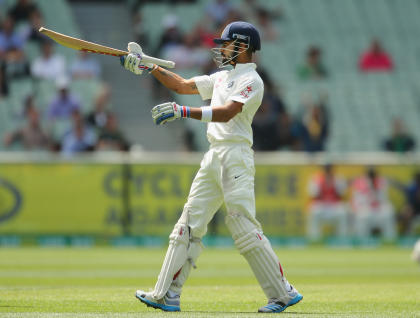Stop Telling Virat Kohli To Calm Down
He’s proved adequately that he knows how to channel his aggression. He won’t need Australian cricketers with dubious behavioural records to advice him.

On the matter of Virat Kohli talking about his problems with Mitchell Johnson, the quote of the day comes from David Warner.
“If that's the way he wants to go about his cricket then let him be. At the end of the day we also play cricket the aggressive way. Though I personally feel that whatever happens in the field should stay on the field. It shouldn't be brought off the field,” he said.
This talk of things “staying on the field” sounds all good till you realise it is coming from a guy who only last year punched Joe Root at a bar—presumably, a bar located off the field.
What about the time their coach Darren Lehmann went on a radio show—presumably one not located on a cricket field—to call Stuart Broad a cheat, and wished the Australian public would abuse him and send him home crying?
Besides, who decided it’s a good idea for things to “stay on the field”, as Ryan Harris insisted the other day? Maybe I don’t want it to “stay on the field” after you’ve abused me all day, made personal comments about my social life, my ability, my family, sometimes even my race. Maybe I’m emotional and upset about those things. Maybe it’s not in my culture to silently take abuse, and I ought to call you out in public for your lack of common decency and etiquette.
Apologists are quick to tell us that Australian cricketers are nice off the field, and quick to compliment an opponent for good performance. On air, Matthew Hayden has been trying to hardsell this nice image. But maybe I don’t want to shake your hand and share beers with you in the evening when you’ve been abusing me all morning. So stop telling us how nice you are when all the evidence points to the contrary.
There are stories about how John Buchanan instructed his team to stop socialising with their England colleagues before an Ashes series. Buchanan wanted to play with their heads. So even a polite “good morning” from an England player would be returned with stony silence from the Australian. There’s professionalism and there’s bad behaviour. Like Anil Kumble reminded us at a press conference in 2008, Australia aren't very good at differentiating between the two.
This brings us to Kohli. Why must he calm down? Cheteshwar Pujara has been calm and focussed all tour. Has it been working for him? The point I’m trying to make is this: Kohli’s natural aggression works for him. He’s been hit on the helmet. He’s been abused. He has frequently lost composure in this series. At the end of it all, his tally of runs for the series is 499. Maybe the aggression is working for him. He’s a modern day Miandad—a big ticket performer, a match winner who also happens to be prolific with the lip.

The abusive behaviour of Australian cricketers has tended to provoke abusive responses from their opponents, who sometimes aren't very good at it. But Kohli doesn't have the language problem that India's players from previous generations had. Kohli is going to give back as good as he gets. So why don't Australia shut it and get on with the game?
P.S.—Why do a vast majority of incidents about poor on-field behaviour involve Australia? Isn't it time they understood that most people don't want to "play hard"? Perhaps they need the same advice that's been given to Palestine: if they don't like getting bombed by Israel, try not bombing Israel in the first place.
Want to have a chat about this article with the author? Get in touch on Twitter.
________________________
ALSO READ:
Stop The Abuse, This Is Not War, by Sidharth Monga
Personal abuse and ugly send-offs can be stamped out. Remember, some of the most celebrated and effective sledges have been inconspicuous. It is not a battlefield out there, no matter the number of war clichés spouted by lazy commentators and journalists. It might not be any worse than in the past, pressures might be bringing out the worst in the players, but it's never too late to start making a change for the better.
Enough With The On-field Chatter, by Ian Chappell
I don't have any problem with gamesmanship. This is the thoughtful and often humorous use of wit to entice an unsuspecting player into losing his concentration. When bowling into the footmarks to Sourav Ganguly from round the wicket, Shane Warne provided a classic example of gamesmanship. After Ganguly had let a couple of balls go, Warne remarked; "Hey mate, the crowd didn't pay their money to watch you let balls go. They came here to see this little bloke [pointing to Sachin Tendulkar at the non-striker's end] play shots."
If a batsman is silly enough to fall for such a ploy then more fool him. Gamesmanship has been part of cricket since its inception and it's also been responsible for a lot of the humour that adds colour to the descriptions of the contest. There's a big difference between gamesmanship and personal abuse, or the constant inane chatter fielders use to try to distract batsmen.
Any abuse should result in the offender being spoken to in no uncertain terms by the umpires. If it continues then the offender should be hit with a substantial suspension, one that will cause him and other players to think twice before they mouth off again. And umpires should be told by the administrators that they will be backed to the hilt in an endeavour to rid the game of both abuse and excessive chatter.

 Yahoo Sport
Yahoo Sport 







































